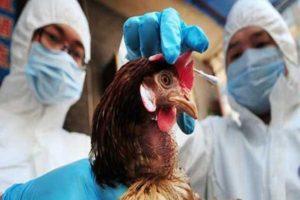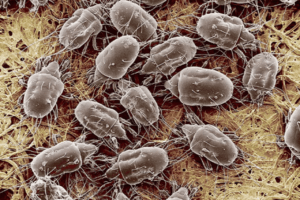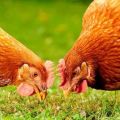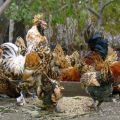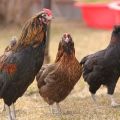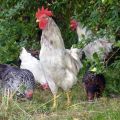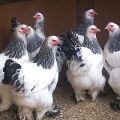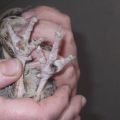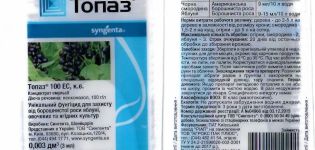How to remove fleas from chickens with folk remedies and preparations, processing rules
A very common problem for poultry owners is the appearance of fleas, especially often in chickens. They are difficult to detect in the initial stages of damage due to their rather small size, and the reproduction of these parasites occurs at an enormous rate. And if you do not take measures to get rid of fleas, this can lead to an outbreak of various diseases and massive pestilence.
What is a chicken flea and how to spot it
Chicken fleas outwardly differ little from those that parasitize domestic animals and other mammals. They are quite small, often difficult to distinguish with the naked eye among the feathers. Fleas have a flattened body, about 1.5 millimeters long, covered with a strong carapace shell. The color is dark - from burgundy to brown.
Thanks to their developed hind limbs and the ability to jump far, they quickly spread among chickens. Fleas attack birds with large colonies, which include hundreds of parasites. The flea is firmly fixed on the skin, this allows it to parasitize on the victim for a long time.
The most comfortable temperature for their life and development is +40 C degrees, so they will quickly die on the body of another animal or person.
Symptoms of the appearance
In most cases, the defeat begins imperceptibly, pests are practically invisible under the feathers. This is facilitated by the very small size of the fleas. Only when the parasites crawl out to feed on the open areas of the chicken body (head and legs) can they be seen with the naked eye. Outwardly, they resemble brown growths or clusters of moles.

And this, in turn, means that the colony of parasites on the bird has grown to hundreds, and possibly thousands of inhabitants. This spread is already becoming dangerous to the health and life of the chicken. For the rapid reproduction of parasites, a combination of factors is needed, such as: lack of cleaning and preventive treatments, change of chicken bedding, warmth, high humidity.
Harm and symptoms:
- pain and constant itching from parasite bites - chickens begin to peck at themselves and pluck feathers;
- anxiety and irritability, birds look disheveled, unkempt;
- sharp weight loss with good appetite;
- the appearance of bald patches on the feather cover;
- a visible decrease in egg production;
- dark crusts, growths that appear near the eyes or crest, and under the feathers everything is literally "teeming" with fleas;
- the danger of infection with helminths, nervous and physical exhaustion, the subsequent massive death of birds.
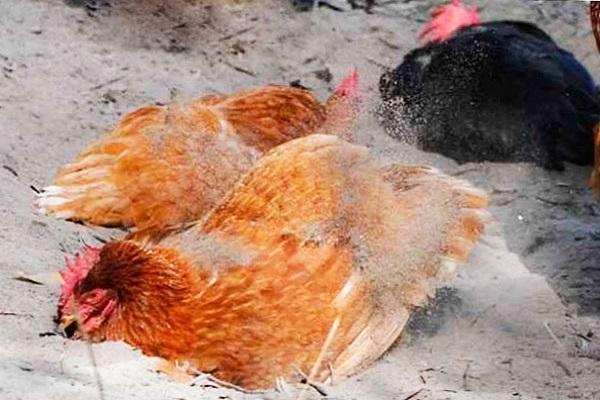
How to get rid of chicken fleas
To get rid of birds from small parasites, both proven chemicals and effective folk methods are used.
By chemical means
There are now enough chemicals on the market to combat parasites, which are used for both chickens and other animals. They are presented in the form of drops, aerosols, powders, ointments and emulsions.
Butox
The chemical agent Butoks-50 will help to remove fleas from chickens. This drug is used for external treatment of birds, as well as other animals. Butox is also suitable for disinfection of residential and business premises. It is a light yellowish oily liquid. It is characterized by a very effective action against various parasites.
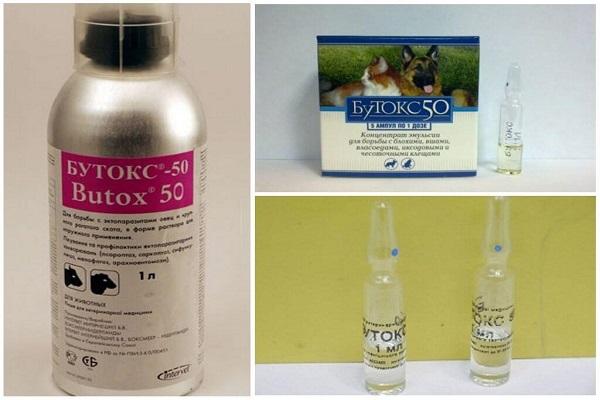
It is doubly pleasant when choosing a drug that, with all its advantages, it costs relatively little and differs in ease of use, and the positive result will be noticeable after the first time.
The active ingredient of Butox is pyrethroid deltamethrin, which is part of many well-known insecticides. It gradually accumulates in the body of parasites and has a strong effect on the nervous system, causing paralysis and death of fleas. Tellingly, insects just die, and do not scatter after using the drug. To rid the chickens of them, Butox is used for spraying birds, healing baths and treating chicken coops.
To prepare a solution for bathing birds, 0.9 liters of Butox is added to 1 ton of cool water. Then everything is mixed well to evenly distribute the drug in the liquid. After chickens, groups of 10-20 birds are driven through a bath with a medicinal solution. For spraying, the following concentration is used: 100 milliliters of the chemical is added to 100 liters of water and mixed thoroughly.
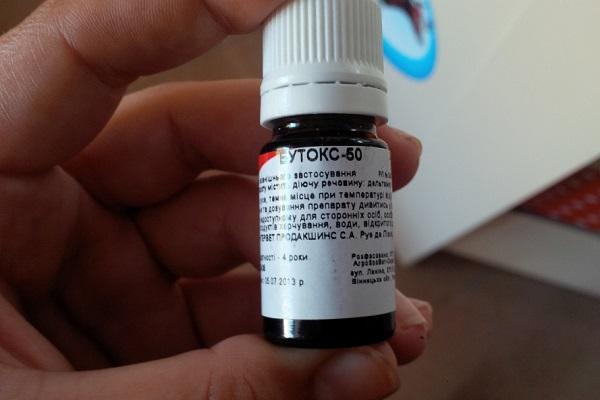
Then the entire feather cover is well treated with a spray bottle and allowed to dry. It is not necessary to wash off the liquid after spraying. In addition to treating the birds directly, the premises in which they are kept must also be protected. For this, a solution is prepared with which the entire chicken coop is well sprayed. The concentration is 20-30 milliliters of the drug per bucket of water.
Deltamethrin powder
To get rid of birds from parasites, another effective chemical agent is used - deltometrin powder. Produced under various names: Basalt, Barrier and in various packaging, from 7 grams to 3 kilograms. The drug, at the recommended dosage and compliance with safety rules, is low-toxic, not dangerous for warm-blooded animals and birds.
It is a grayish-white powder with a sharp, specific odor. For treatment, it is applied to the skin of a bird, spreading feathers with fingers, and dusting the feathers directly. Spraying of birds with the help of aerosols is also used, the consumption is 10-15 grams of the drug per 1 chicken.
The powder is also suitable for treating an empty chicken coop - the consumption rate is 100-150 grams per 1 square meter of area.
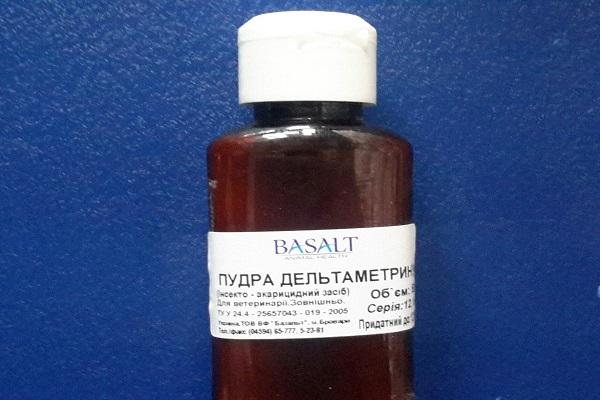
Folk remedies
To get rid of parasites will help not only chemical, but also folk remedies tested by more than one generation.
Herbs
Healing and spicy herbs with a strong smell help to fight bloodsuckers. But it is important to remember that folk remedies are effective only in the initial stages of infection, as well as for preventing the appearance of fleas. With severe damage, only chemical agents are effective.
The smell of herbs such as wormwood or tansy, lavender, rosemary, chamomile, oppresses and repels fleas. They are added to bedding, scattered around the chicken coop, and they also make bouquets (brooms) of them, hanging from the ceiling.
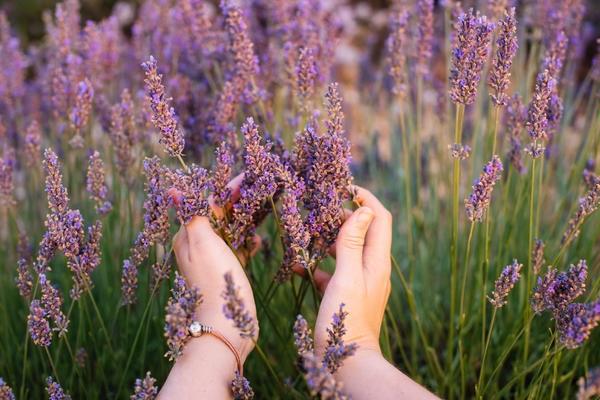
Decoctions and infusions
To combat fleas, decoctions, infusions of aromatic spicy and medicinal herbs are used. Wormwood has proven itself especially well.To prepare the broth, take 50-60 grams of fresh plants (although dry plants can also be used) and pour them with 1 liter of boiling water. Then they are steamed for 10-15 minutes and after cooling, rubbed into the skin of the chickens.
The method of preparation of the infusion is as follows: take 30 grams of wormwood and tansy and pour 3 cups of boiling water. After it is boiled for 10 minutes, and then infused from evening to morning. After they filter and spray the chicken coop with it, paying special attention to secluded places.
Ash
The most convenient and simple way to prevent damage and fight fleas is wood ash (in pure form or mixed with river sand). In a chicken coop or a walking yard, containers (baths, basins) with the mixture are placed. Chickens, taking such baths, themselves get rid of pests that cannot tolerate ash. Moreover, the chickens themselves know when it is time to "swim".
The owners will be faced with the task of only periodically pouring out the old ash and adding new ones.
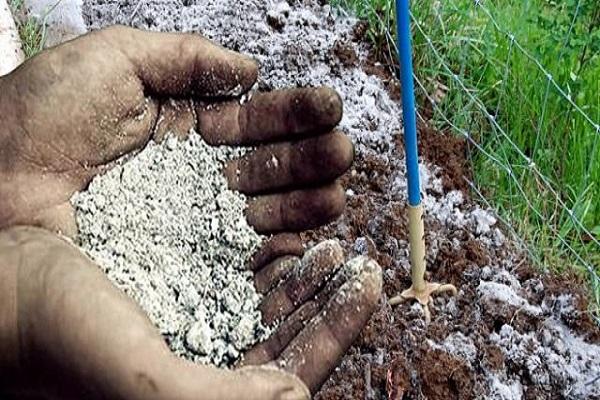
Consequences for chickens
Parasites in chickens, especially when they are massively spread, can cause significant harm - fleas are carriers of many diseases and contribute to infection with parasites:
- Brucellosis (or Bruce's disease).
- Salmonellosis.
- Trypanosomiasis.
- Helminths.
- Plague.
- Sleeping sickness.
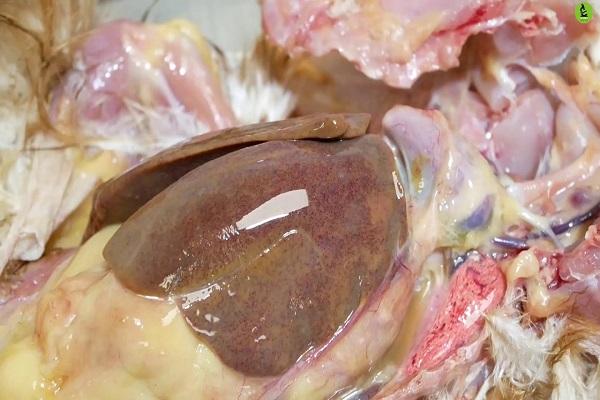
Danger to humans
This type of flea itself is safe for humans and other animals - they cannot bite through the skin and live at inappropriate temperatures. But when in contact with a bird that is infected with diseases carried by fleas, a person can become infected himself.
Infection occurs both when eating meat, eggs of sick birds, and through tactile contact. And the consequences for a person can be very serious, up to and including death..

Preventive actions
To maintain high productivity and health of chickens, owners need to regularly carry out flea prevention, including the following factors:
- you need to fence the walking yard with a net, avoid contact of domestic chickens with other, including neighboring, birds;
- regular cleaning in the chicken coop, periodic change of bedding;
- the use of folk methods to prevent the appearance;
- periodic "bathing" of chickens in ash baths, setting them up in the exercise yard.
